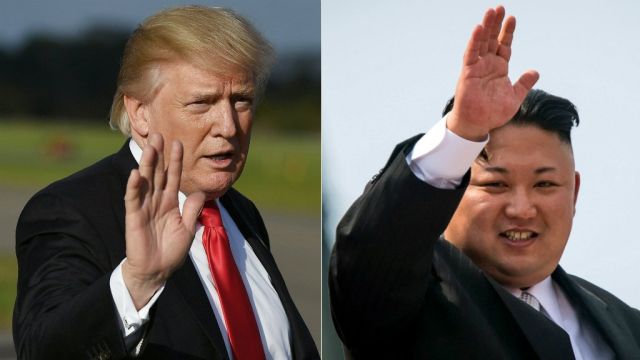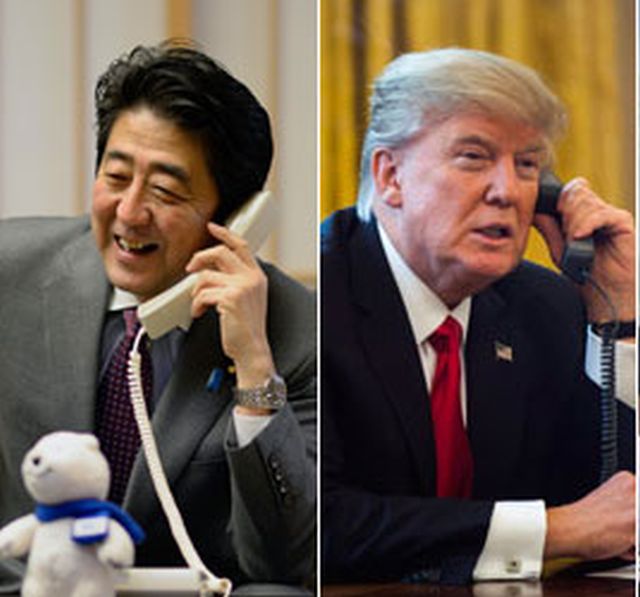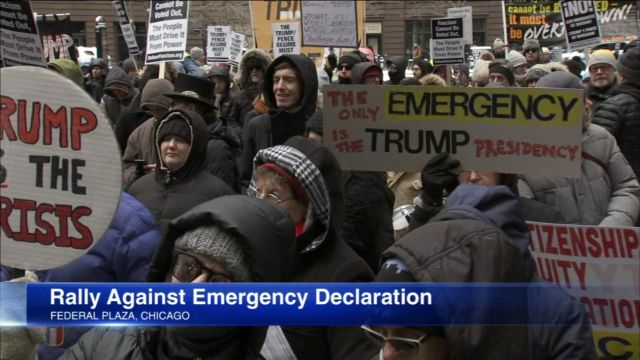
by Editor | May 25, 2021 | World
 Washington : US President Donald Trump and Chinese Vice Premier Liu He expressed optimism that the two countries would reach a trade agreement and defuse a dispute between the world’s two largest economies, as both sides agreed to continue their negotiations for two more days.
Washington : US President Donald Trump and Chinese Vice Premier Liu He expressed optimism that the two countries would reach a trade agreement and defuse a dispute between the world’s two largest economies, as both sides agreed to continue their negotiations for two more days.
“I would say that it’s more likely that a deal will happen,” Trump told the media on Friday at the White House.
“The fact that they’re willing to stay for quite a bit longer period, doubling up the time, that means something,” Trump said, adding: “I think there’s a good chance that it happens.”
Speaking through an interpreter, Liu, China’s top trade negotiator, said: “We believe that it is very likely that it will happen. And we hope that ultimately we will have a deal.”
Liu has been granted authority to negotiate directly with the US by Chinese President Xi Jinping, the Voice of America (VOA) news reported.
Liu also brought a letter from Xi where the President thaned Trump for the “lovely video” the Trumps’ grandchildren made for Xi and his wife to mark the Chinese Lunar New Year.
US Treasury Secretary Steven Mnuchin confirmed that talks have been extended through Sunday.
Trump also appeared to ease on his threat to more than double tariffs on $200 billion worth of Chinese goods if no deal is achieved by the March 1 deadline which was agreed by the two leaders during a December 1 meeting in Buenos Aires.
“You can tell this to President Xi,” Trump said to Liu. “If I see progress being made, substantial progress being made, it would not be inappropriate to extend that deadline, keep it at 10 per cent instead of raising it to 25 per cent. And I would be inclined to doing that.”
The US is calling on China to make structural changes on key issues such as stopping the theft of American technology and reining in improper subsidies and other advantages provided to state-owned companies.
Trump said he expected to meet Xi to work out the finer points of the deal. “Probably in Mar-a-Lago, probably fairly soon.”
The two countries imposed more than $360 billion in tariffs in two-way trade last year, after Trump triggered the trade dispute over complaints of unfair trade practices, the VOA reported.
The tariffs have weighed heavily on both countries’ manufacturing sectors and raised concern they could exacerbate the global economic slowdown.
In Friday’s meeting, Mnuchin told Trump that “currency manipulation”, a significant sticking point in the trade talks, had been resolved.
“We’ve actually concluded and reached an agreement, one of the strongest agreements ever on currency, but we have a lot of work to do over the next two days,” Mnuchin said.
Details of the currency deal or any other part of the agreement have not yet been released.
This week’s round of talks in Washington was originally scheduled to last two days.
In pursuit of an accord, China has already adopted several goodwill measures, such as lowering tariffs on imported vehicles from the US, resuming soy purchases from the US and introducing an initiative that would prohibit forced technology transfer from American countries doing business in the Asian nation.
—IANS

by Editor | May 25, 2021 | Business Summit, Events, Social Round-up, World
 Washington : US President Donald Trump and North Korean leader Kim Jong-un will spend some time one-on-one next week at their second summit in Vietnam, White House officials said on Thursday.
Washington : US President Donald Trump and North Korean leader Kim Jong-un will spend some time one-on-one next week at their second summit in Vietnam, White House officials said on Thursday.
The summit, scheduled for February 27-28 in Hanoi, will “be similar in format to what you saw last June 12 in Singapore,” an official said in a conference call with reporters, speaking on condition of anonymity.
“There will be an opportunity for the two leaders to see one another one-on-one, to share a meal and engage in expanded meetings of their respective delegations,” the official said, reports Efe.
The White House has not made Trump’s agenda public yet and the source did not specify whether the private meeting — accompanied only by their respective interpreters — would occur at the beginning of the summit, as was the case in Singapore.
In Singapore, the leaders spoke privately for 38 minutes before the formal talks between the full delegations, sparking speculation about the content of Trump’s conversation with Kim.
The joint statement that emerged from the Singapore talks said that North Korea pledged to “work toward complete denuclearisation of the Korean peninsula” in exchange for unspecified security guarantees from the US.
One goal for next week’s encounter is reaching agreement on a “shared definition” of what denuclearisation means in concrete terms, the US official said.
Trump has also talked lately about North Korea’s economic potential and its advantageous location between Russia and China, so he is expected to expand further on that issue when he sees Kim, according to Efe.
“President Trump is looking to — after really, in some respects, breaking the ice with Kim in June — to talk in more depth about the kind of future that North Korea could enjoy if it follows through on its commitment to final and full denuclearisation,” one of the officials said.
One of the White House officials acknowledged that Pyongyang’s intention remains a mystery.
“I don’t know if North Korea has made the choice yet to denuclearise, but the reason why we’re engaged in this is because we believe there’s a possibility that North Korea can make the choice to fully denuclearize,” the official said.
“And that’s why the president has assigned such a priority to engaging with them,” the official added.
—IANS

by Editor | May 25, 2021 | Business Summit, Events, Social Round-up, World
 Washington : President Donald Trump on Wednesday had a phone conversation with Japanese Prime Minister Shinzo Abe about the upcoming summit between the US and the North Korea, the White House said.
Washington : President Donald Trump on Wednesday had a phone conversation with Japanese Prime Minister Shinzo Abe about the upcoming summit between the US and the North Korea, the White House said.
White House Press Secretary Sarah Sanders said in a statement that Trump and Abe in their phone call reaffirmed their commitment to achieving the final, fully verified denuclearisation of the North Korea and discussed the upcoming Hanoi summit between Trump and Kim Jong Un, top North Korea leader, at the end of this month.
Trump and Abe committed to coordinating closely in advance of the US-North Korea talks, according to the statement, reports Xinhua news agency.
“We firmly and closely coordinated our policies in the run-up to the second US-North Korea summit to resolve nuclear, missile and abduction issues,” Abe said after the phone talks with Trump.
Trump announced on February 8 that his second meeting with Kim would take place in Hanoi of Vietnam on February 27-28.
—IANS

by Editor | May 25, 2021 | World
 Washington : Sixteen states on Monday evening filed a lawsuit challenging US President Donald Trump’s national emergency declaration.
Washington : Sixteen states on Monday evening filed a lawsuit challenging US President Donald Trump’s national emergency declaration.
The group of states, led by California Attorney General Xavier Becerra, filed the lawsuit in the US District Court for the Northern District of California.
“We’re going to try to halt the President from violating the Constitution, the separation of powers, from stealing money from Americans and states that has been allocated by Congress, lawfully,” Becerra told CNN.
The attorneys general from Colorado, Connecticut, Delaware, Hawaii, Illinois, Maine, Maryland, Michigan, Minnesota, Nevada, New Jersey, New Mexico, New York, Oregon and Virginia joined California in the lawsuit.
It’s the latest challenge to hit the Trump administration, which already faces a litany of lawsuits over the national emergency declaration.
Over the weekend, the Center for Biological Diversity, Border Network for Human Rights, which marched with Beto O’Rourke in El Paso, Texas, last week, and the American Civil Liberties Union all announced lawsuits, reports CNN.
At the core of each lawsuit is the argument that Trump is circumventing Congress to fund the wall along the US-Mexico border by declaring an emergency.
“The Constitution assigns Congress the power of the purse, and no prior president has ever tried to use emergency powers to fund a chosen project — particularly a permanent, large-scale domestic project such as this — against congressional will. This is obviously improper,” said Dror Ladin, staff attorney with the ACLU’s National Security Project.
Becerra argued that the states have standing to challenge Trump because money appropriated to them might be at risk.
“If the President is essentially stealing money that’s been allocated to go to the various states for various purposes but no longer will, we’re being harmed, our people are being harmed,” he said.
The wave of lawsuits was expected, though fighting them in court will likely be difficult.
The National Emergencies Act allows the President to declare a national emergency and unlock a stash of funds by invoking certain statutory authority. The President has wide discretion over what constitutes a national emergency. As a result, legal experts argue that fighting the declaration on the basis of the emergency itself will likely be difficult. The other question is whether the statute Trump has invoked — which in this case, requires the use of the armed forces — can be used to fund the wall.
Under the declaration, the administration will tap $2.5 billion of military narcotics funding and $3.6 billion in military construction funding. Acting US Defense Secretary Patrick Shanahan said he will start studying which projects to pull from and determine whether border barriers are necessary to support the use of the armed forces.
It’s not just lawsuits that the administration has to face, but also the possibility of a joint resolution put forth by House Democrats to terminate the declaration. The resolution would need to be voted on by the House and then the Senate, before heading to the President’s desk.
On Sunday, White House adviser Stephen Miller indicated that Trump would cast the first veto of his presidency if lawmakers tried to terminate the declaration.
—IANS

by Editor | May 25, 2021 | World
 Washington : US President Donald Trump will declare a national emergency to fund his planned border wall with Mexico, the White House has said.
Washington : US President Donald Trump will declare a national emergency to fund his planned border wall with Mexico, the White House has said.
He will sign a border security bill to avert a government shutdown, but also act to bypass Congress and use military funds for the wall, a statement said.
Senior Democrats have responded by accusing him of committing a “gross abuse of power” and a “lawless act”, the BBC reported on Friday.
The Congress passed the bill on Thursday which does not meet Trump’s demands for wall funding. It now has to be signed by the President to become law.
The compromise legislation passed by Congress includes $1.3 billion in funding for border security, including physical barriers, but it does not allot money towards the border wall for which Trump had wanted $5.7 billion.
“The President is once again delivering on his promise to build the wall, protect the border, and secure our great country,” White House Press Secretary Sarah Sanders said in a statement on Thursday.
She added he would “take other executive action – including a national emergency – to ensure we stop the national security and humanitarian crisis at the border”.
Speaking on the Senate floor on Thursday, however, Republican leader Mitch McConnell indicated his support for the move, saying the President was taking action with “whatever tools he can legally use to enhance his efforts to secure the border”.
In a 83-16 vote, the Senate on Thursday passed the border security bill. The House of Representatives later also backed the measure, by 300 to 128.
Speaker of the House Nancy Pelosi has already suggested a legal challenge from Democrats should the President make an emergency declaration.
She and Senate Democratic leader Chuck Schumer also issued a joint statement condemning the move.
“Declaring a national emergency would be a lawless act, a gross abuse of the power of the presidency and a desperate attempt to distract from the fact that President Trump broke his core promise to have Mexico pay for his wall,” they said.
Republicans fear this will set a precedent for presidential power that Democrats can someday use to circumvent the will of Congress.
—IANS

 Washington : US President Donald Trump and Chinese Vice Premier Liu He expressed optimism that the two countries would reach a trade agreement and defuse a dispute between the world’s two largest economies, as both sides agreed to continue their negotiations for two more days.
Washington : US President Donald Trump and Chinese Vice Premier Liu He expressed optimism that the two countries would reach a trade agreement and defuse a dispute between the world’s two largest economies, as both sides agreed to continue their negotiations for two more days.



